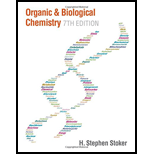
Concept explainers
Interpretation: To determine the organ that produces glucagon.
Concept introduction: Hormones are the special chemical messengers that are produced by glands in the living organisms. Hormones are responsible for the regulation of psychological activities and behavioral activities, such as
Glucose is a monosaccharide with the molecular formula
Glycogenolysis is the metabolic pathway that converts glycogen to
Want to see the full answer?
Check out a sample textbook solution
Chapter 13 Solutions
Organic And Biological Chemistry
- QUESTION 41 In the deficiency referred to in question 40, a deficiency of the form of develops which makes the erythrocyte susceptible to oxidative destruction oxidized, oxaloacetate O oxidized, glutathione reduced, oxaloacetate reduced, glutathionearrow_forwardIs omega 3 the only essential fatty acid that humans cannot synthesize?arrow_forwardWhat is the most common starting material for gluconeogenesis?arrow_forward
 General, Organic, and Biological ChemistryChemistryISBN:9781285853918Author:H. Stephen StokerPublisher:Cengage Learning
General, Organic, and Biological ChemistryChemistryISBN:9781285853918Author:H. Stephen StokerPublisher:Cengage Learning Organic And Biological ChemistryChemistryISBN:9781305081079Author:STOKER, H. Stephen (howard Stephen)Publisher:Cengage Learning,
Organic And Biological ChemistryChemistryISBN:9781305081079Author:STOKER, H. Stephen (howard Stephen)Publisher:Cengage Learning, Chemistry for Today: General, Organic, and Bioche...ChemistryISBN:9781305960060Author:Spencer L. Seager, Michael R. Slabaugh, Maren S. HansenPublisher:Cengage Learning
Chemistry for Today: General, Organic, and Bioche...ChemistryISBN:9781305960060Author:Spencer L. Seager, Michael R. Slabaugh, Maren S. HansenPublisher:Cengage Learning Introduction to General, Organic and BiochemistryChemistryISBN:9781285869759Author:Frederick A. Bettelheim, William H. Brown, Mary K. Campbell, Shawn O. Farrell, Omar TorresPublisher:Cengage Learning
Introduction to General, Organic and BiochemistryChemistryISBN:9781285869759Author:Frederick A. Bettelheim, William H. Brown, Mary K. Campbell, Shawn O. Farrell, Omar TorresPublisher:Cengage Learning




